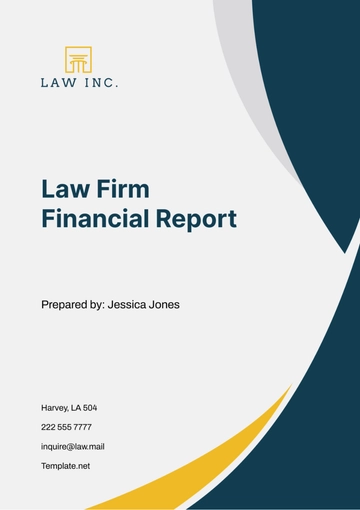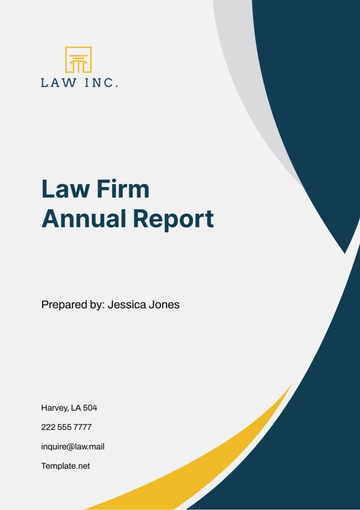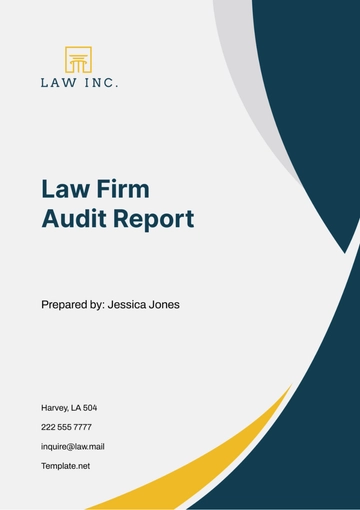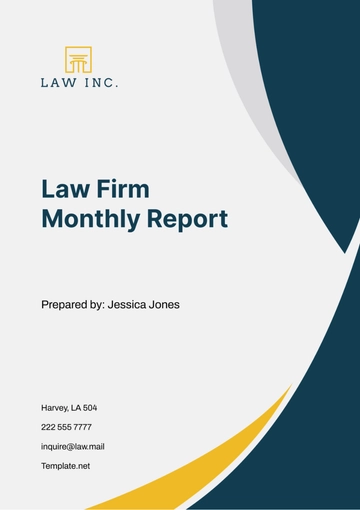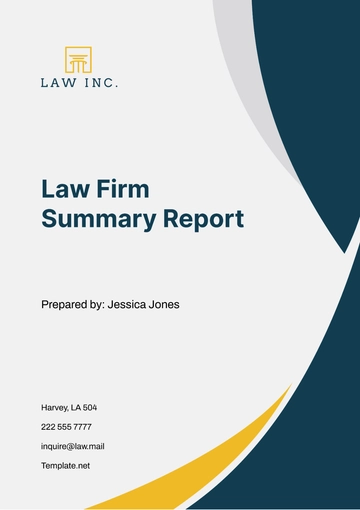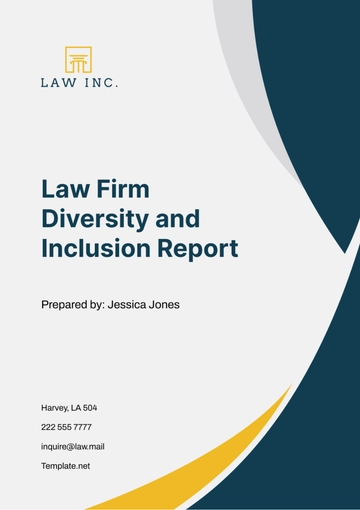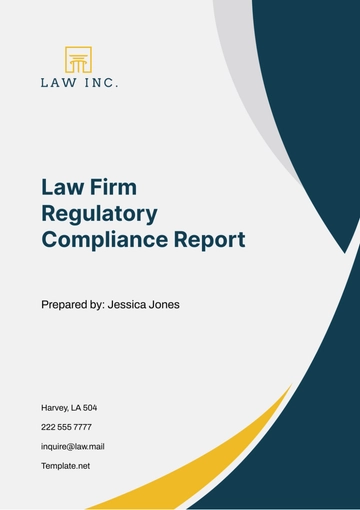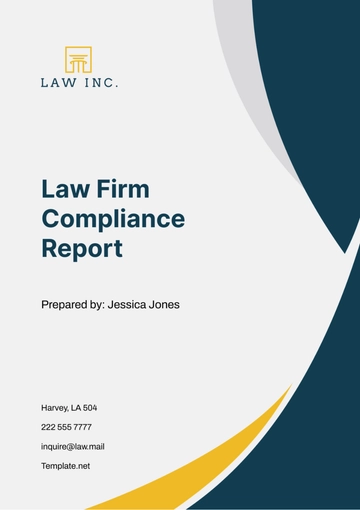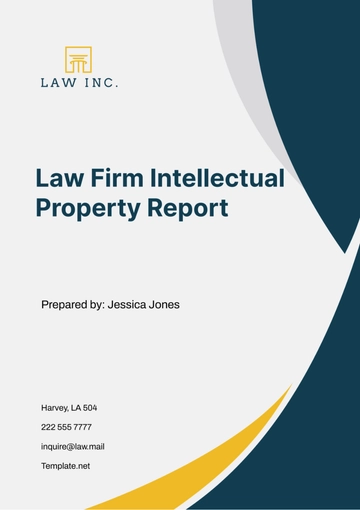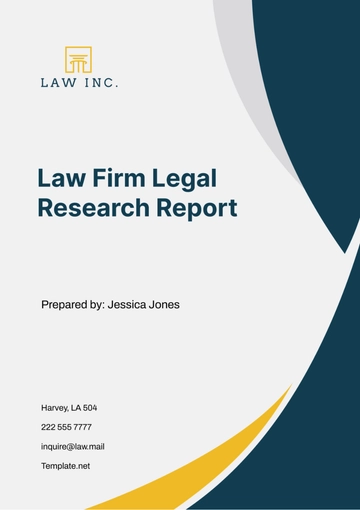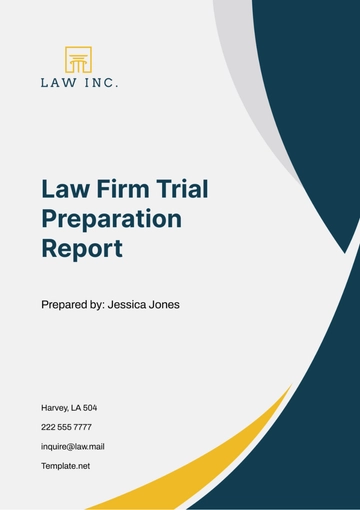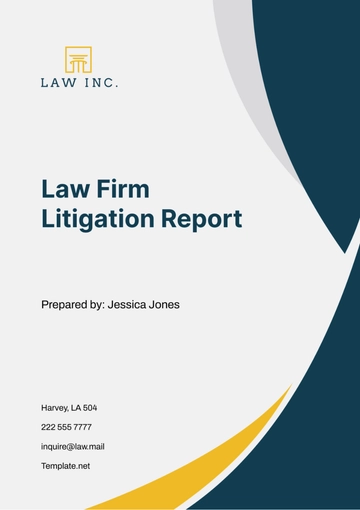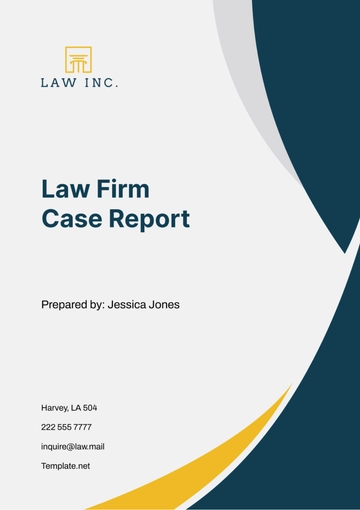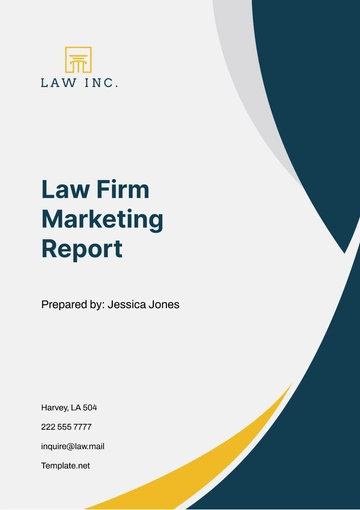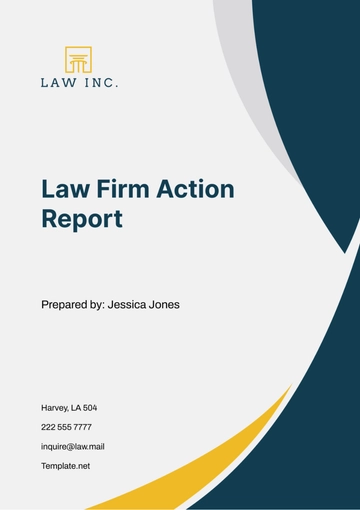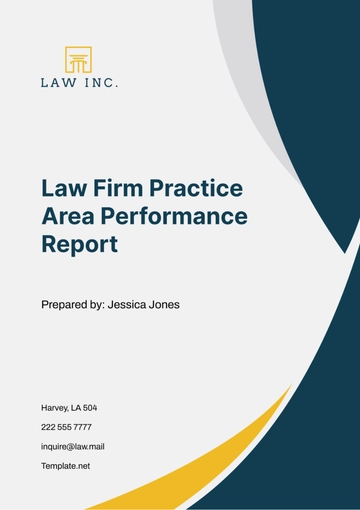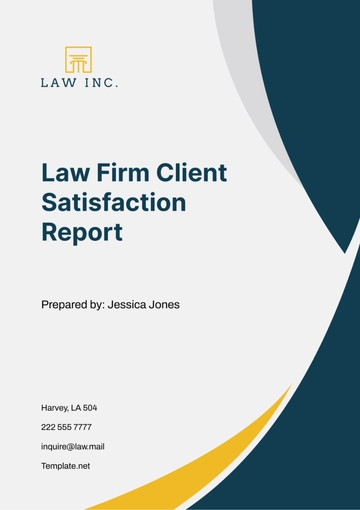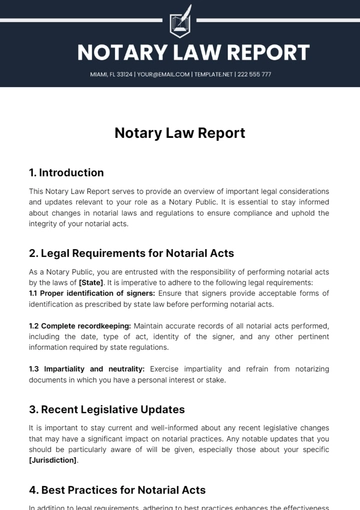Free Law Firm Case Report
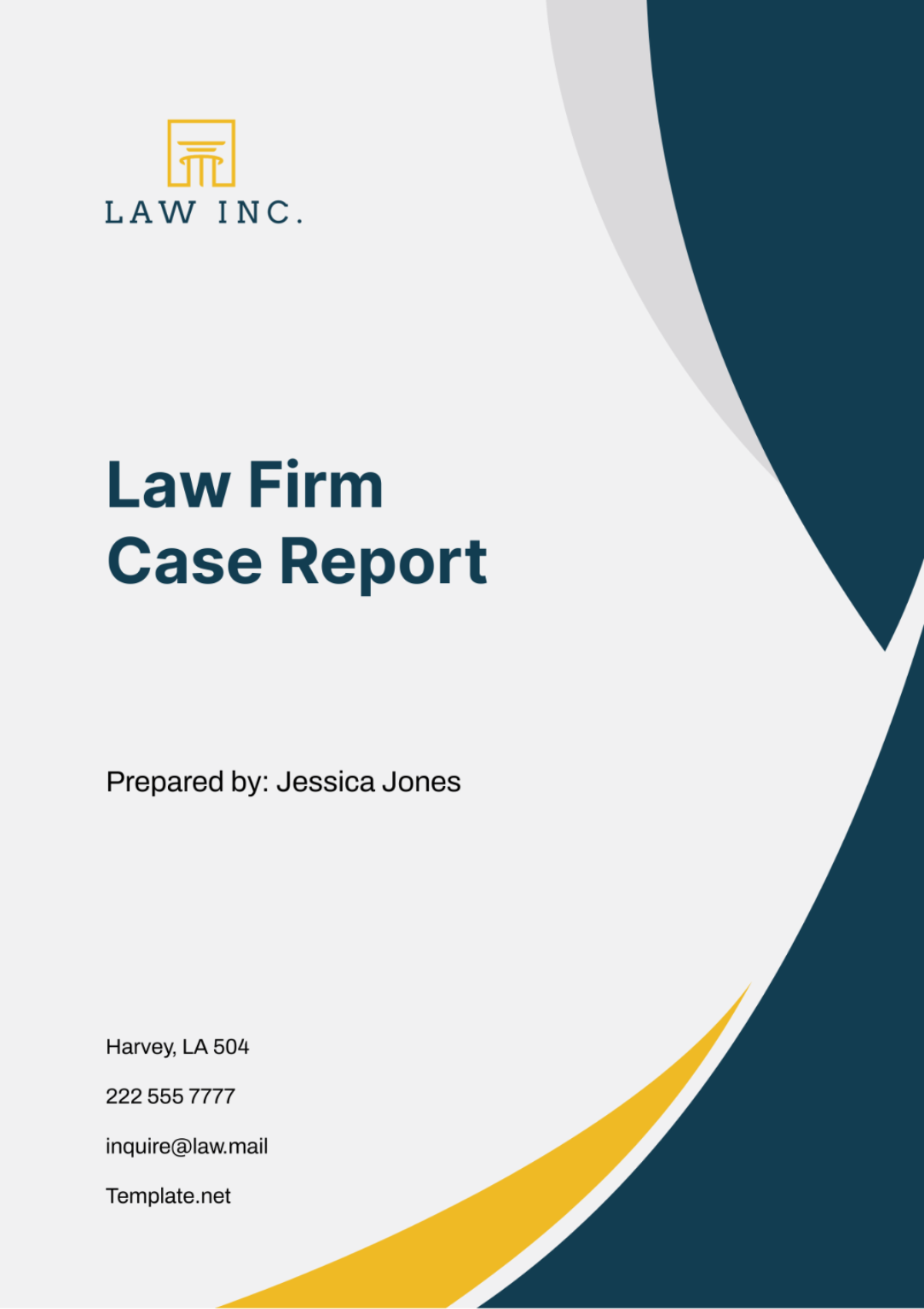
I. Introduction
A. Overview
Purpose
This case report aims to provide a comprehensive analysis of the legal proceedings and outcomes surrounding the case of Smith v. Johnson, a property dispute handled by [Your Company Name]. The report will examine the factual background, legal issues, arguments presented by both parties, and the final judgment rendered by the court.
Scope
The scope of this report encompasses a detailed exploration of the legal and factual complexities involved in the case. It will analyze the relevant laws, regulations, precedents, and evidence to provide insights into the dispute between Mr. John Smith (Plaintiff) and Ms. Emily Johnson (Defendant) regarding property rights to a parcel of land located at [Address].
B. Background
Case Description
Smith v. Johnson involves a contentious dispute over ownership of a piece of land. Mr. Smith asserts his claim to the property based on inheritance, while Ms. Johnson contests his ownership, citing adverse possession.
Parties Involved
The primary parties in the case are:
John Smith (Plaintiff): Inherited the property from his father.
Emily Johnson (Defendant): Occupied the property and claims adverse possession rights.
Party | Role | Contact Information |
|---|---|---|
John Smith | Plaintiff | [Your Company Email] |
Emily Johnson | Defendant | [Your Company Email] |
C. Legal Framework
Relevant Laws and Regulations
Property Law: The relevant statutes and regulations governing property rights in the state of [Your State] include:
[Property Law Act]: This statute outlines the legal requirements for property ownership, transfer, and inheritance.
[State-specific Real Property Acts]: These acts specify the procedures for recording property titles, deeds, and transfers.
Adverse Possession Doctrine: The principles of adverse possession are governed by common law and statutory provisions in [Your State]. Adverse possession allows an individual to claim ownership of another person's property by openly and continuously occupying it for a certain period, typically ranging from 5 to 20 years, depending on state law. The key elements of adverse possession include:
Actual Possession: The adverse possessor must physically possess the property in question.
Open and Notorious Use: The possession must be open and obvious to the true owner and the public.
Exclusive Use: The adverse possessor must use the property exclusively, excluding the rightful owner.
Hostile Possession: The possession must be without the permission of the true owner and in opposition to their rights.
Precedents
Key precedents include:
Doe v. Roe (2050): In this landmark case, the court established the elements necessary to establish adverse possession under [Your State] law. The ruling clarified the requirements for continuous use, hostility, and exclusivity in adverse possession claims.
Smithson v. Johnson (2055): The court's decision in this case provided guidance on the notice requirements for adverse possessors in [Your State]. The precedent set by this case is relevant to determining whether a property owner has provided adequate notice of eviction to a party claiming adverse possession rights.
II. Facts
A. Chronology of Events
Timeline
Date | Event |
|---|---|
January 1, 2060 | John Smith inherits property from his father |
March 15, 2060 | Emily Johnson begins occupying the property |
April 2, 2060 | John Smith discovers Ms. Johnson's occupancy |
May 10, 2060 | John Smith serves Ms. Johnson with eviction notice |
June 20, 2060 | Mr. Smith files a lawsuit against Ms. Johnson |
B. Key Facts
Facts Supporting the Plaintiff
John Smith legally inherited the property from his father as per the terms of a valid will.
Mr. Smith possesses documentary evidence, including the will and property deed, confirming his ownership.
Ms. Johnson lacks any legal claim or title deed to the property.
Facts Supporting the Defendant
Emily Johnson openly occupied and maintained the property for over a decade, meeting the statutory requirements for adverse possession.
Ms. Johnson made substantial improvements to the property during her occupancy.
III. Issues
A. Legal Issues
Primary Legal Issues The primary legal issues in Smith v. Johnson include:
Ownership Rights: Whether John Smith's inheritance confers valid ownership of the disputed property.
Adverse Possession: Whether Emily Johnson's occupancy and improvements satisfy the legal requirements for adverse possession.
Validity of Title: Whether Ms. Johnson has acquired legal title through adverse possession despite Mr. Smith's prior ownership claim.
Subsidiary Legal Issues In addition to the primary issues, subsidiary legal matters include:
Notice Requirements: Whether Mr. Smith provided adequate notice to Ms. Johnson regarding the eviction.
Estoppel: Whether Ms. Johnson's actions or statements may estop her from claiming adverse possession.
B. Factual Issues
Disputed Facts The key disputed facts in the case are:
Duration of Occupancy: The exact period during which Ms. Johnson has been in continuous possession of the property.
Intent: Whether Ms. Johnson occupied the property with the intent to claim ownership through adverse possession.
Improvements: The nature and extent of the improvements made by Ms. Johnson on the property.
IV. Analysis
A. Legal Analysis
Case Law Analysis
The case law analysis will delve into pertinent legal precedents concerning property rights, inheritance, adverse possession, and notice requirements. Key cases to be considered include:
Doe v. Roe: This seminal case established crucial elements required to establish adverse possession under [Your State] law. It clarified the necessity of continuous use, hostility, and exclusivity in adverse possession claims, which will serve as a benchmark in evaluating the current dispute.
Smithson v. Johnson: The ruling in this case provided valuable insights into the notice requirements for adverse possessors in [Your State]. It addressed the obligations of property owners in notifying individuals claiming adverse possession rights, which will be crucial in determining the validity of Mr. Smith's eviction notice to Ms. Johnson.
Statutory Analysis
This section will meticulously analyze relevant statutes and regulations governing property ownership and adverse possession rights in [Your State]. Particular attention will be given to:
Property Law Act: This statute outlines the legal framework governing property ownership, transfer, and inheritance in [Your State]. It will be instrumental in determining the validity of Mr. Smith's claim to the property based on inheritance.
Adverse Possession Laws: [Your State]'s adverse possession laws, as codified in state statutes, will be scrutinized to ascertain the statutory requirements for adverse possession claims. This analysis will focus on the statute of limitations for adverse possession and any statutory notice requirements for property owners.
B. Factual Analysis
Examination of Evidence
The factual analysis will rigorously evaluate the evidence presented by both parties. This includes:
Property Deed and Will: The validity and authenticity of the property deed and will, establishing Mr. Smith's ownership claim to the property, will be examined in detail.
Eviction Notice: The adequacy and compliance of Mr. Smith's eviction notice to Ms. Johnson will be assessed to determine whether it met the statutory requirements under [Your State] law.
Documentation of Improvements: Any documentation provided by Ms. Johnson regarding her improvements to the property will be reviewed to ascertain the extent and significance of her investment in the property.
Witness Testimonies
The credibility and consistency of witness testimonies, including those of John Smith, Emily Johnson, and any relevant third parties, will be carefully scrutinized. Witness statements regarding the duration and nature of Ms. Johnson's occupancy and Mr. Smith's ownership claims will be assessed for their reliability and impact on the case.
V. Arguments
A. Plaintiff's Arguments
Legal Arguments
The plaintiff, John Smith, asserts the following legal arguments:
Ownership Title: Mr. Smith legally inherited the property from his father and holds a valid title deed, establishing his rightful ownership.
Lack of Adverse Possession: Ms. Johnson's occupancy does not meet the statutory requirements for adverse possession, as it lacks exclusivity, hostility, and open and notorious use.
Notice Compliance: Mr. Smith provided Ms. Johnson with proper notice of eviction in accordance with state law, thereby fulfilling his legal obligations.
Factual Arguments
In support of his legal claims, Mr. Smith presents the following factual arguments:
Continuous Ownership: Mr. Smith and his family have continuously owned and used the property for generations, without interruption or abandonment.
Lack of Intent: Ms. Johnson's occupancy was not accompanied by the requisite intent to claim ownership through adverse possession, as she was aware of Mr. Smith's title to the property.
B. Defendant's Arguments
Legal Arguments
The defendant, Emily Johnson, contends the following legal arguments:
Adverse Possession: Ms. Johnson's continuous, exclusive, and open use of the property for over a decade meets the legal requirements for adverse possession, granting her ownership rights.
Estoppel: Mr. Smith's failure to take action against Ms. Johnson's occupancy over the years, coupled with her substantial investment in improving the property, estops him from asserting his ownership claim.
Factual Arguments
Ms. Johnson supports her legal arguments with the following factual claims:
Continuous Possession: Ms. Johnson has openly and exclusively occupied the property for more than ten years, maintaining it as her primary residence.
Improvements: Ms. Johnson has invested significant time and resources into enhancing the property, demonstrating her intention to possess and improve it as her own.
VI. Precedents
A. Relevant Precedents
Case Precedents
The following case precedents are relevant to the legal issues in Smith v. Johnson:
Doe v. Roe: This case established the elements necessary to establish adverse possession under [Your State] law, including continuous use, hostility, and exclusivity.
Smithson v. Johnson: The court's ruling in this case clarified the requirements for providing notice of eviction to adverse possessors in [Your State].
Recent Legal Developments
Recent legal developments, such as legislative changes or appellate court decisions, may impact the outcome of Smith v. Johnson. However, no significant developments have occurred since the initiation of this case.
VII. Recommendations
A. Legal Strategy
Recommended Course of Action
Based on the analysis of the legal and factual issues, [Your Company Name] recommends the following legal strategy:
Continue Vigorous Defense: Advocate for John Smith's rightful ownership of the property based on clear inheritance and title deed documentation.
Challenge Adverse Possession Claim: Contest Emily Johnson's adverse possession claim by demonstrating the lack of exclusivity, hostility, and open use required by law.
Assert Compliance with Notice Requirements: Assert that Mr. Smith provided proper notice of eviction to Ms. Johnson, complying with all statutory requirements.
Settlement Options
While vigorously defending Mr. Smith's ownership rights, [Your Company Name] also recommends exploring potential settlement options, including:
Mediation: Engage in mediation to negotiate a mutually acceptable resolution that preserves Mr. Smith's ownership rights while addressing Ms. Johnson's concerns.
Property Partition: Explore the possibility of partitioning the property to allocate ownership rights between Mr. Smith and Ms. Johnson, if feasible and agreeable.
B. Risk Assessment
Assessment of Risks
In assessing the risks associated with the case, [Your Company Name] identifies the following potential challenges:
Adverse Possession Claim: There is a risk that the court may find in favor of Ms. Johnson's adverse possession claim if her occupancy is deemed to meet the legal requirements.
Estoppel Argument: Ms. Johnson's estoppel argument, if accepted by the court, could preclude Mr. Smith from asserting his ownership rights, leading to an unfavorable outcome.
Legal Costs: Protracted litigation may result in substantial legal costs and expenses for both parties.
Mitigation Measures
To mitigate these risks, [Your Company Name] recommends the following measures:
Thorough Documentation: Ensure comprehensive documentation of Mr. Smith's ownership rights, including wills, title deeds, and evidence of continuous use.
Robust Legal Defense: Provide a strong legal defense against Ms. Johnson's adverse possession claim, supported by expert testimony and persuasive argumentation.
Negotiation and Settlement: Explore settlement options early in the litigation process to potentially resolve the dispute amicably and minimize legal costs.
VIII. Conclusion
A. Summary
Smith v. Johnson presents complex legal and factual issues surrounding a property dispute between John Smith and Emily Johnson. The outcome of the case will depend on the court's assessment of each party's legal arguments, factual evidence, and adherence to statutory requirements.
B. Future Considerations
Moving forward, [Your Company Name] will continue to diligently represent Mr. Smith's interests in the litigation, pursuing a favorable outcome through strategic legal advocacy and negotiation.
[Your Company Name] will closely monitor developments in the case, including any new evidence or legal precedents that may arise, and adjust the legal strategy as necessary to maximize the likelihood of success for Mr. Smith.
- 100% Customizable, free editor
- Access 1 Million+ Templates, photo’s & graphics
- Download or share as a template
- Click and replace photos, graphics, text, backgrounds
- Resize, crop, AI write & more
- Access advanced editor
Easily compile case details with Template.net's Law Firm Case Report Template. This editable and customizable document streamlines the documentation process, ensuring accuracy and professionalism. Crafted by legal experts, it aligns with industry standards and best practices. Editable in our Ai Editor Tool for seamless customization and integration into your firm's case management system.
You may also like
- Sales Report
- Daily Report
- Project Report
- Business Report
- Weekly Report
- Incident Report
- Annual Report
- Report Layout
- Report Design
- Progress Report
- Marketing Report
- Company Report
- Monthly Report
- Audit Report
- Status Report
- School Report
- Reports Hr
- Management Report
- Project Status Report
- Handover Report
- Health And Safety Report
- Restaurant Report
- Construction Report
- Research Report
- Evaluation Report
- Investigation Report
- Employee Report
- Advertising Report
- Weekly Status Report
- Project Management Report
- Finance Report
- Service Report
- Technical Report
- Meeting Report
- Quarterly Report
- Inspection Report
- Medical Report
- Test Report
- Summary Report
- Inventory Report
- Valuation Report
- Operations Report
- Payroll Report
- Training Report
- Job Report
- Case Report
- Performance Report
- Board Report
- Internal Audit Report
- Student Report
- Monthly Management Report
- Small Business Report
- Accident Report
- Call Center Report
- Activity Report
- IT and Software Report
- Internship Report
- Visit Report
- Product Report
- Book Report
- Property Report
- Recruitment Report
- University Report
- Event Report
- SEO Report
- Conference Report
- Narrative Report
- Nursing Home Report
- Preschool Report
- Call Report
- Customer Report
- Employee Incident Report
- Accomplishment Report
- Social Media Report
- Work From Home Report
- Security Report
- Damage Report
- Quality Report
- Internal Report
- Nurse Report
- Real Estate Report
- Hotel Report
- Equipment Report
- Credit Report
- Field Report
- Non Profit Report
- Maintenance Report
- News Report
- Survey Report
- Executive Report
- Law Firm Report
- Advertising Agency Report
- Interior Design Report
- Travel Agency Report
- Stock Report
- Salon Report
- Bug Report
- Workplace Report
- Action Report
- Investor Report
- Cleaning Services Report
- Consulting Report
- Freelancer Report
- Site Visit Report
- Trip Report
- Classroom Observation Report
- Vehicle Report
- Final Report
- Software Report
